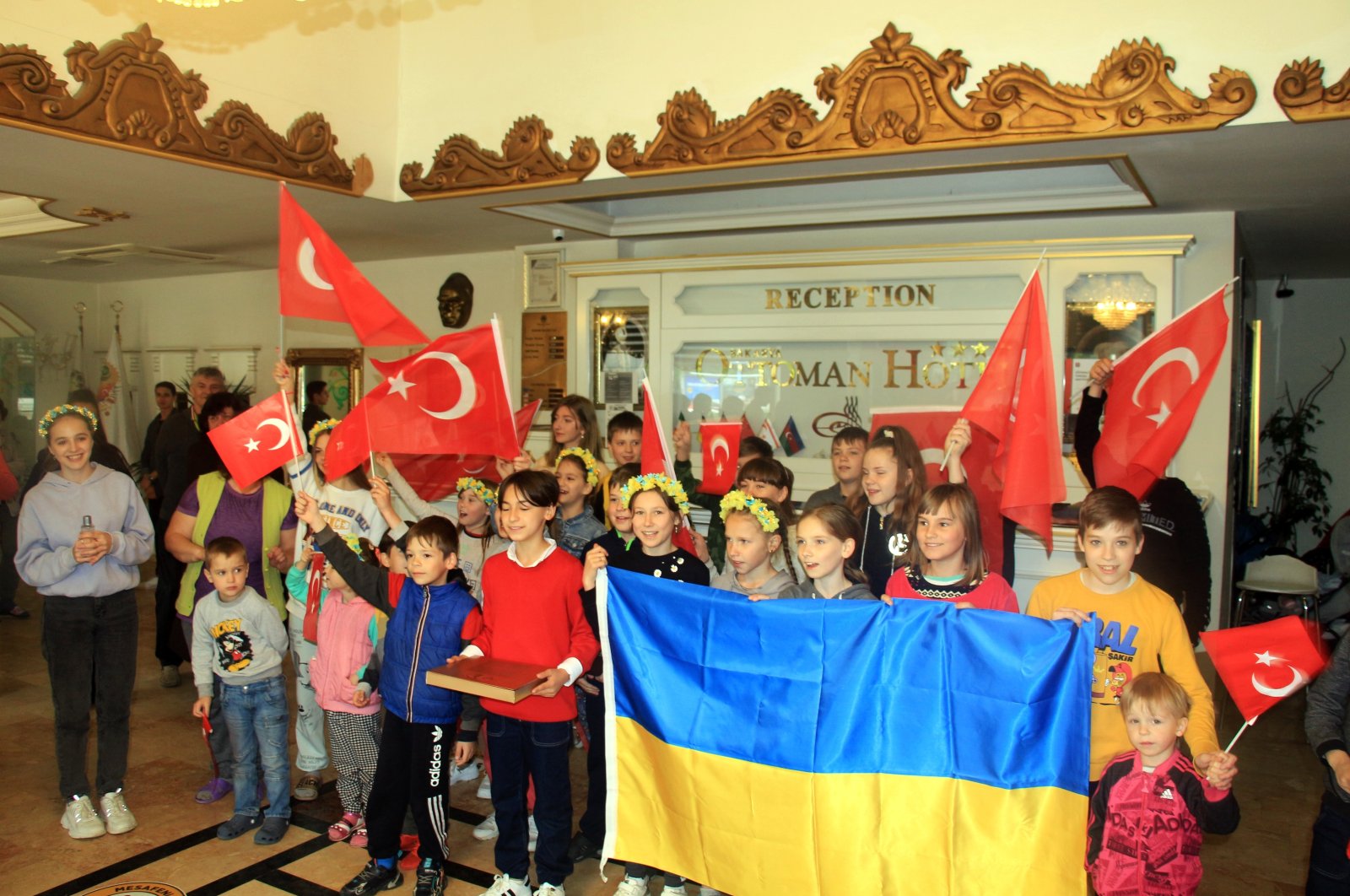The ongoing conflict in Ukraine is most devastating for vulnerable communities, namely the elderly and the children. With orphanages caught in the middle of the violence, for orphans, it means losing their only home. Turkey has pioneered efforts in its region to evacuate and shelter the children.
Since the conflict erupted, 988 orphans and 392 carers and custodians have been brought to the country thanks to the efforts led by the two countries’ first ladies. Across Turkey, the Ministry of Family and Social Services strives to provide them shelter and psychiatric/social support to help them overcome the trauma of displacement.
The first group of orphans and their carers arrived in Turkey on March 25, a few weeks after the conflict broke out. Eight more groups of orphans arrived later. They are accommodated in hotels in the southern provinces of Antalya and Muğla and the northwestern province of Sakarya. The government addresses all the needs of the orphans and others evacuated to the country. The ministry assigns staff who are able to communicate with the orphans in their native language and regularly conduct interviews to address their problems.
The ministry’s social aid and solidarity foundations, normally tasked with assisting disadvantaged communities, take care of the orphans, including overseeing regular health checks. The children are also provided with stationery so they can resume their education.
The ministry also runs integration programs for children and most recently, brought them together with Turkish children on the occasion of Children’s Day, a holiday celebrated on April 23 dedicated to children in the country. Cooperating with the Turkish Red Crescent, UNICEF and nongovernmental organizations (NGOs), the ministry organizes social, cultural, sports and educational activities for Ukrainian children. The children will also be enrolled in Turkish language classes to adapt to their new lives in Turkey.
Turkey already has experience in helping children affected by conflicts, as the country hosts the largest refugee population from neighboring Syria. Along with regular aid, the country helped thousands of children from Syria to enroll in education.
There are more than 100,000 children in orphanages, boarding schools or homes for the disabled in Ukraine, the highest number in all of Europe, according to the United Nations refugee agency, UNHCR. Many are considered so-called social orphans as their parents or other relatives are alive but unable to care for them in the country, one of Europe’s poorest. Since the conflict began, at least 8,000 minors in care have been taken abroad or relocated within Ukraine, according to official data. About 31,000 have been returned to their parents, and officials estimate that at least 2,500 others are trapped in active fighting zones and need to be evacuated. The U.N.’s International Organization for Migration has already warned refugees fleeing the country to beware of traffickers eager to take advantage of the chaotic exodus. And in March, Ukraine imposed new rules for the evacuation and monitoring of orphans, but NGOs say more still needs to be done.
Ukraine is facing “a child protection crisis of extraordinary proportions” which may not have been seen before, a UNICEF official said last Friday. “Hundreds of children have been killed, and many more injured. Nearly 200 attacks have been reported against health care facilities, and schools continue to be impacted by strikes,” Aaron Greenberg, UNICEF’s regional child protection adviser for Europe and Central Asia, said while speaking from the Ukrainian city of Lviv at a biweekly press conference hosted by the U.N. in Geneva.
He said two months of the war that Russia launched in Ukraine has left 7.7 million people internally displaced and driven over 5.5 million people across international borders, including nearly two-thirds of all children in Ukraine. “The war has impacted all children’s psychosocial wellbeing,” said the UNICEF official as the U.N. announced that at least 324 children are known to have been killed due to the war. “Children have been uprooted from their homes, separated from caregivers, and directly exposed to war. Children have been shaken by bomb explosions and the blaring sirens of missile alert systems.” He said that nearly all children are coping with the absence of their fathers, older male siblings, or uncles as almost all men between the ages of 18 and 60 are mobilized for the war. “And, most importantly, many children have witnessed or experienced physical and sexual violence,” said Greenberg. “Let me emphasize a particular problem we’re seeing. The workforce in Ukraine-social workers, child psychologists, and other professionals-are equally impacted by this conflict.”
He said UNICEF is anticipating numbers for all forms of violence against children to be in the tens of thousands.
Source:dailysabah.com
